Inside this Iowan’s astonishing recovery from bedridden to top-ranked NCAA equestrian recruit
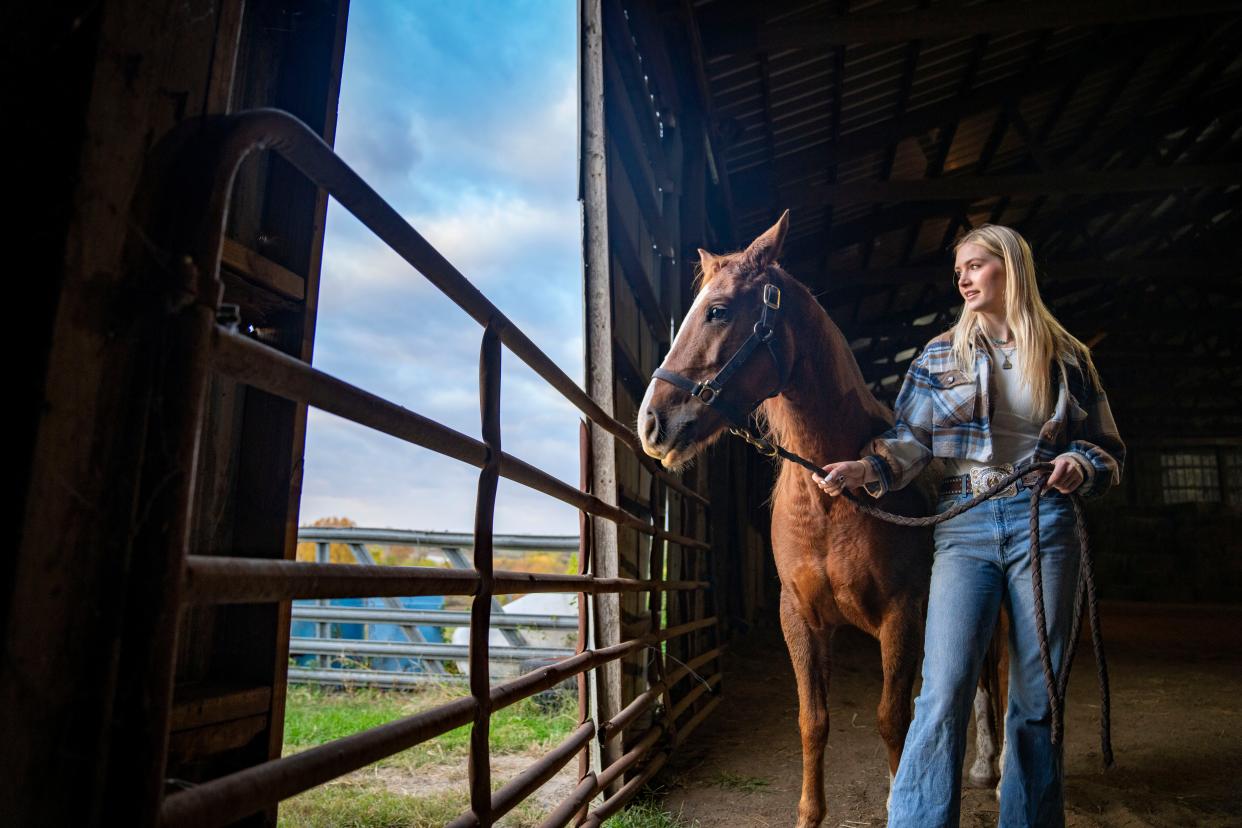
The voice on the other end of Dawn Papcun’s phone isn't her daughter’s — at least not its normal cadence and tenor.
This voice is breathy and deep, like every syllable is a battle with her diaphragm. And this voice is scared. Really scared.
Mom. Come. I’m hurt.
Dawn all but flings the spaghetti she’d been making for dinner — noodles tumbling onto the counter and the floor — and takes off across the family’s acreage near Norwalk. She bounds over fences dividing various paddocks and runs where the family’s horses practice and play. She zigzags through barns and outbuildings, their wooden boards creaking under her footfalls’ force. And she blows right through muddy puddles, remnants of the recent rainstorms lapping her ankles.
She wouldn’t realize until the ambulance left that she wasn’t wearing shoes.
There on the indoor arena’s sand floor is her daughter, Elivia, unable to move. Maybe Dawn's mind is playing tricks, but when she reaches Elivia’s side, she swears black has started to creep in on her baby’s bright blue irises.
And surrounding her daughter’s lower body are the very obvious markings of a horse’s hind end.
“She looked like a steamroller had gone over her,” Dawn says.
Elivia is ice cold to the touch yet sweating profusely. Dawn, a longtime medical sales representative for an advanced wound care company, has some understanding of trauma cases, so she recognizes these as the signs of internal bleeding.
The horse Elivia had been riding had reared and fallen backward, and when it tried to get up, it had fallen again. And as a longtime horse owner, Dawn knows that with “flip-over accidents, you don't usually get a second chance.”
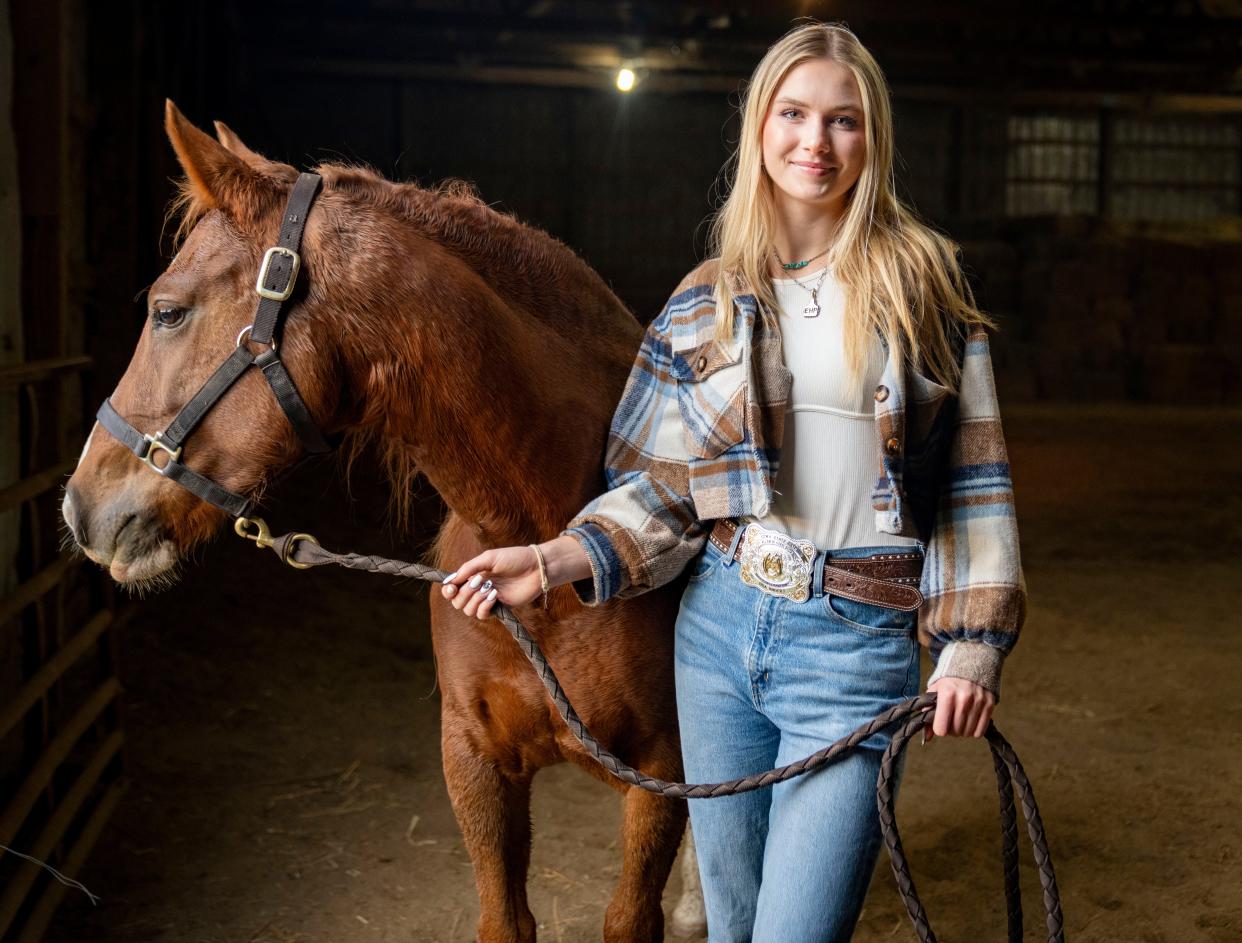
Brains have a funny way of obscuring pain and fear, especially in memories. While Dawn can detail every move and flinch, Elivia doesn’t remember much until the doctor’s diagnosis: Her pelvis is broken in two places and her tailbone, too.
You will heal, but you can’t ride for six to eight months and then maybe only 20 minutes twice a week. Full recovery could be two years away.
And, as with any athletic injury, there’s always a chance you never come back — at least not to 100 percent.
But Elivia has a single-pointed focus: Getting back in the saddle, literally and figuratively.
She was one of the best youth riders in the country. Summer, when the biggest equestrian competitions take place, was just starting, and she was entering the back half of high school, when NCAA equestrian coaches make lists and dole out decisions.
As a young girl, she’d come into her own around horses, like a spark transforming into a roaring fire. And from her hospital bed, she knows horses will be key to her recovery and revival again — even if only in spirit.
So in her time of desperate need, Elivia trains not just her muscles to walk and then ride once more, but her mind — the overachieving, never-back-down synapses of a highly ranked and recruited Division 1 athlete — to see adversity as opportunity and setbacks not as conclusions, but new beginnings.
“I didn't know I was going to get in that accident,” she says, “so it wasn't like I was plotting a major comeback story.”
But dreams are on the line, and slowing down, well, that isn’t an option.
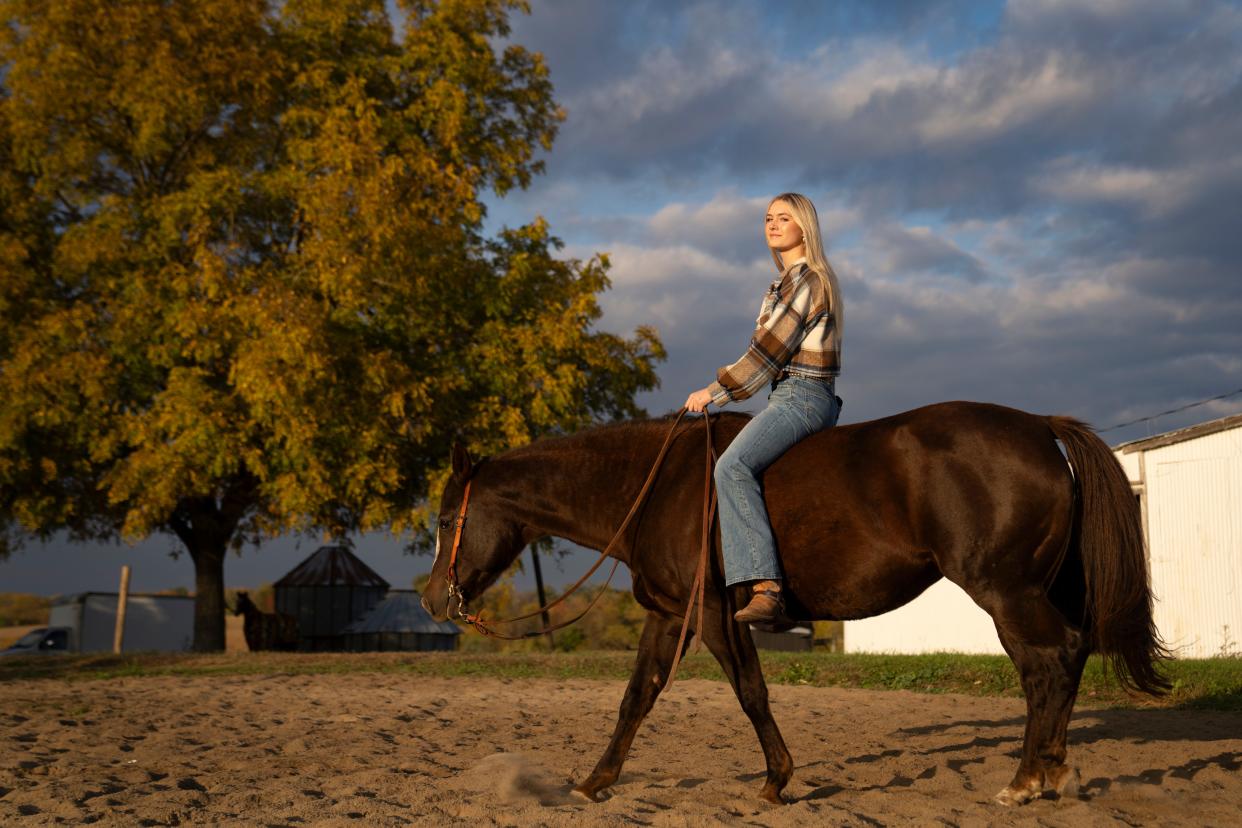
Generations of horse people: The sacrifice in feeding a daughter’s passion
Her younger brother’s special birthday dinner wasn’t for another two hours, plenty of time, Elivia calculates, to get in a training session with Wall-E, the new horse she named for the Wal-Mart parking lot where she’d exchanged $1,000 to keep him from the kill pen.
Unlike kids who need a push to practice or nudge to get to the gym, keeping Elivia out of the barns, making sure she also spends time studying and just being a regular teenager, can sometimes be Dawn’s struggle. Elivia rides three hours a day “like clockwork,” Dawn says, and that’s on top of her weekly lessons, and the grooming and training and feeding and cleaning she does for the four horses that live on her family farm.
Wall-E was still young and untrained that summer afternoon, but Elivia had plenty of experience working out and commanding other foals. So the pair circle the indoor arena, practicing “rundowns,” a maneuver necessary for the sliding stop where a horse’s legs skid under his belly to bring him to a fast halt.
The move’s a showstopper, a big-time ohh and ahh finish that gets the crowd and the horse excited. For Elivia, the trick is a confidence booster, too, the audience's applause like a wave of self-assurance crashing over the naturally introverted teenager.
Back before horses, back when Elivia was young, she was painfully shy. Painfully, Dawn stresses.
Outside of family members, she wouldn’t talk, wouldn’t look people in the eye, her mom says. But around her neighbor’s dog, she came alive. Any animal, Dawn says, and her little girl broke through the bell jar that seemed to settle between her and the outside world.
More from Courtney Crowder: In an Iowa NICU, a nurse strives to give a dying baby one final 'loving embrace'
So they got a Labrador, and started taking the dog to the mall, to the State Fair, anywhere with crowds. As people came up to pet him or ask about his gorgeous coat, Elivia grew more and more comfortable engaging with strangers — a comfort that would only flourish when she finally got her own horse, a mare named Chicken, at about age 8.
Dawn’s family has long been a part of the Iowa equestrian world. “We’ve just been a few generations of horse people out in Norwalk,” she adds.
Her grandfather, Larry, lived on a century farm — the same one where she, Elivia and her parents now live — that always housed boarder horses and a little Shetland pony, which became Elivia’s childhood obsession.
“’I want to ride the pony. I want to ride the pony.’ I mean, it was endless,” Dawn says.
She put her daughter in other activities — volleyball, dance, basketball — but every afternoon “it was literally like dragging her,” Dawn says. She’d make deals with her headstrong little girl: Go to the basketball game, and I’ll take you to ride the pony afterward. Put on the dance costume, and we’ll go visit the farm.
Enough years of bargaining and Dawn was done: “I was like, you know what? I'm going all in. And all we did was horses, all day long. And then it just got bigger and bigger and bigger.”
But feeding her daughter’s passion was not without sacrifice for the single mom of two kids, who was then the new owner of part of her grandfather’s acreage, where there was always another pasture to mow or broken-down fence to fix or barn to reinforce.
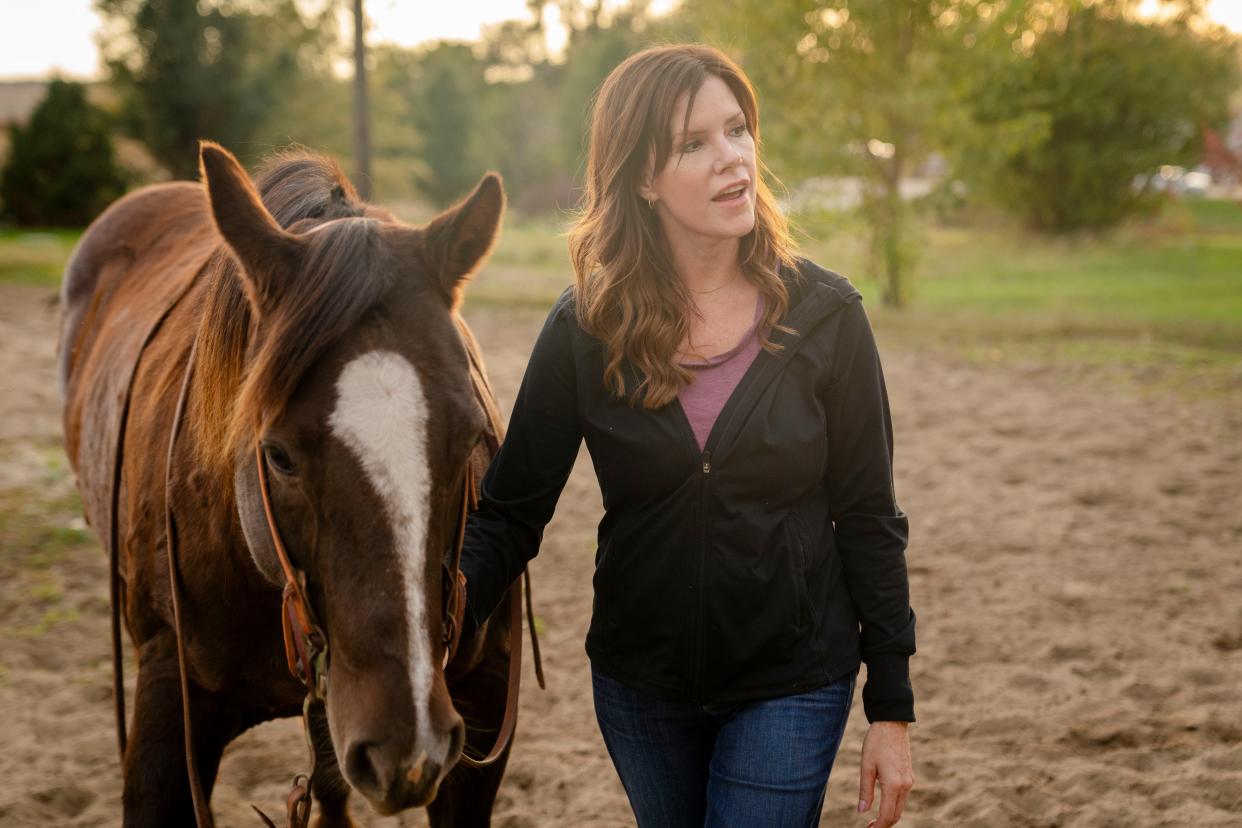
Unlike some who can spend hundreds of thousands of dollars on a horse with the pedigree of champions and outfitted with the best equipment, when the Papcuns bought Chicken, she was an 8-year-old who’d competed only once.
“We don't have heated barns. We have nothing fancy. We've done everything we could do to just patch it all together, keep it all together financially, and keep doing this,” she says.
Even as a little kid, Elivia stepped up to the persistence of not just the sport, but the lifestyle of showing horses. She had to clean buckets and muck stalls and sling hay no matter if she was sick or it's snowing or she snoozed her alarm too many times that morning, she says. And the consequence of falling behind is more than just a missed strength session — it’s that her horse didn't eat.
The connection between horse and human fueled Elivia in and out of the competition ring. Her teammate had moods and whims just like any other, but a horse doesn't speak the same language — at least not literally. So every ride felt like a puzzle.
“It's not like a gymnastics move where you get it down and you do the same thing every single time,” she says. “It's constantly changing and switching what you're doing and your mechanics and figuring out what's working best for that horse that day.”
Elivia had been feeling Wall-E out on that summer afternoon, adjusting as needed. But coming upon the big finish, the pair hits a wet spot just so. Wall-E’s back feet slip. She rears up to catch her balance but falls backward. Directly onto Elivia’s pelvis.
A few inches different and Wall-E would have crushed her spine.
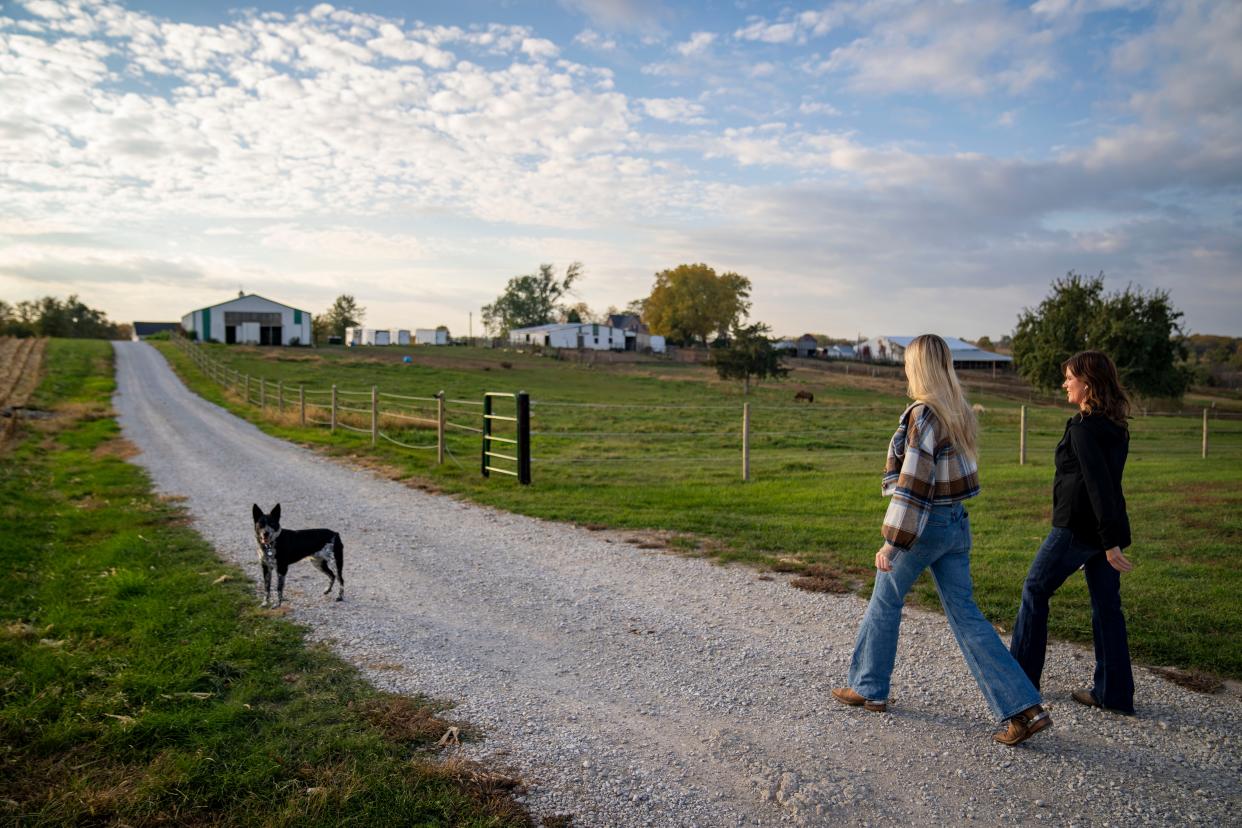
The question that haunts her mother: 'Will she ever ride again?'
Elivia’s legs hang like a plastic skeleton’s: muscles contracted, feet faced awkwardly inward. Her daughter’s long, skinny limbs had been so strong just a few days earlier, Dawn thinks as she stands sentry at the hospital.
With doctors’ approval, nurses had started getting Elivia out of bed. They ply her legs with straps and have her lean on walkers as they try to turn her femurs back into place, her bloodcurdling screams proclaiming the pain in each movement.
“I'm just watching, thinking, ‘This is her whole life. Will she ever ride again?'” Dawn says.
“Will she ever… and if she can't ride anymore, what other things will we do in life that will fulfill us.”
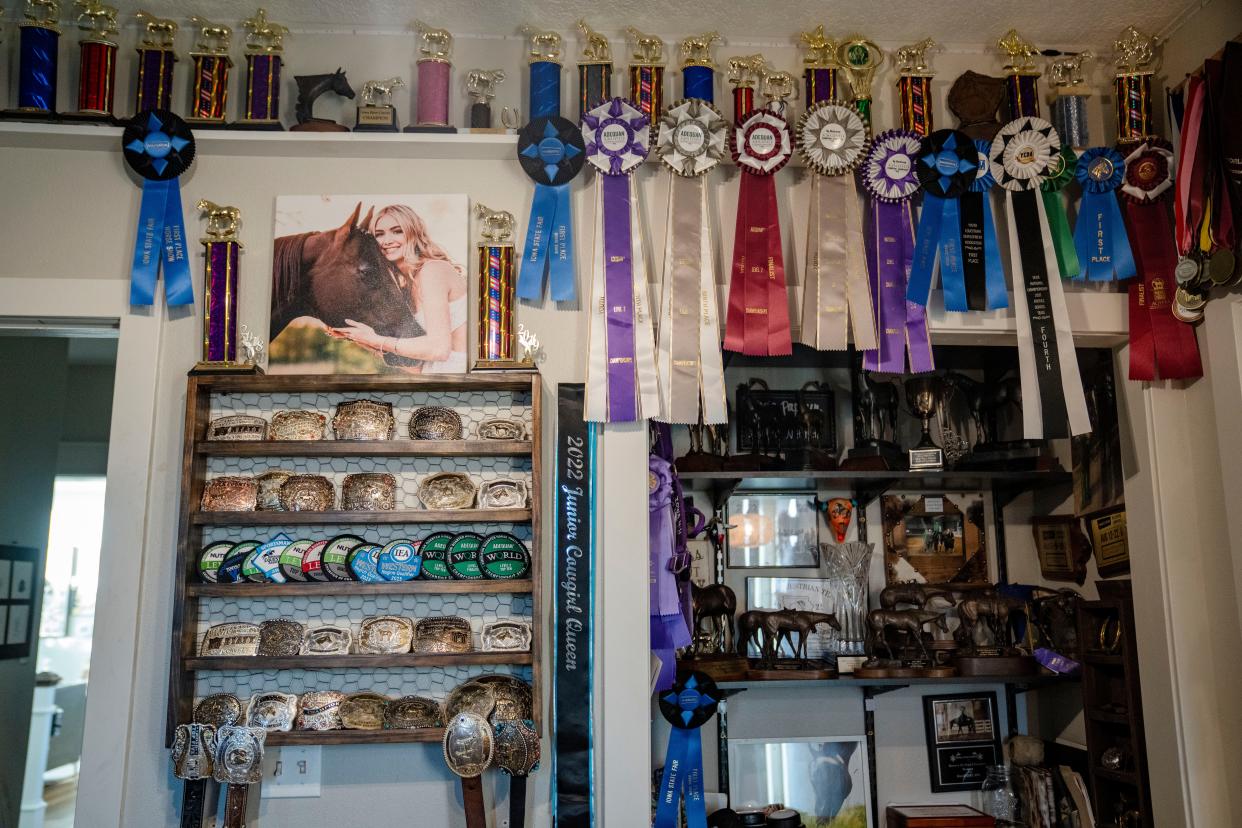
Injury — even serious, career-ending injuries — are never far from most elite riders’ minds. They’re not courted, of course, but talk to enough trainers and industry veterans and you’ll hear some version of the phrase, “That’s just what you sign up for.”
“You’re working with a mind, not a basketball” when you're riding a horse, says Shannon Vroegh, owner of Show Horses by Shannon and one of Elivia’s trainers. And because of a horse’s sheer bulk, even an accidental trip or stumble can be disastrous, she adds.
Laid up in the hospital, surrounded by flowers and well wishes from the Iowa horse community, Elivia sees only two paths forward: “Was I supposed to sit in bed and do nothing and just kind of mope about my situation? Or was I just supposed to keep working hard and try and get back on my horses as fast as possible?”
“There was clearly one option that was gonna work out better in the end, so that gave me motivation.”
She dutifully attends physical therapy and strength coaching, callousing her mind to see any stumbling block as a window to new skills — not a mirror reflecting her inadequacy.
Her mantra became: “If you never fail, if you never lose over and over again, how will you grow?”
When the pain got the best of her, instead of sulking, she’d work “off the saddle,” training Wall-E or Cash, Chicken’s baby, whom Elivia had been conditioning since, literally, birth. The joy of the little moments she shared with them was the same glow she’d felt as a girl around her dog — like her essence was coming alive.
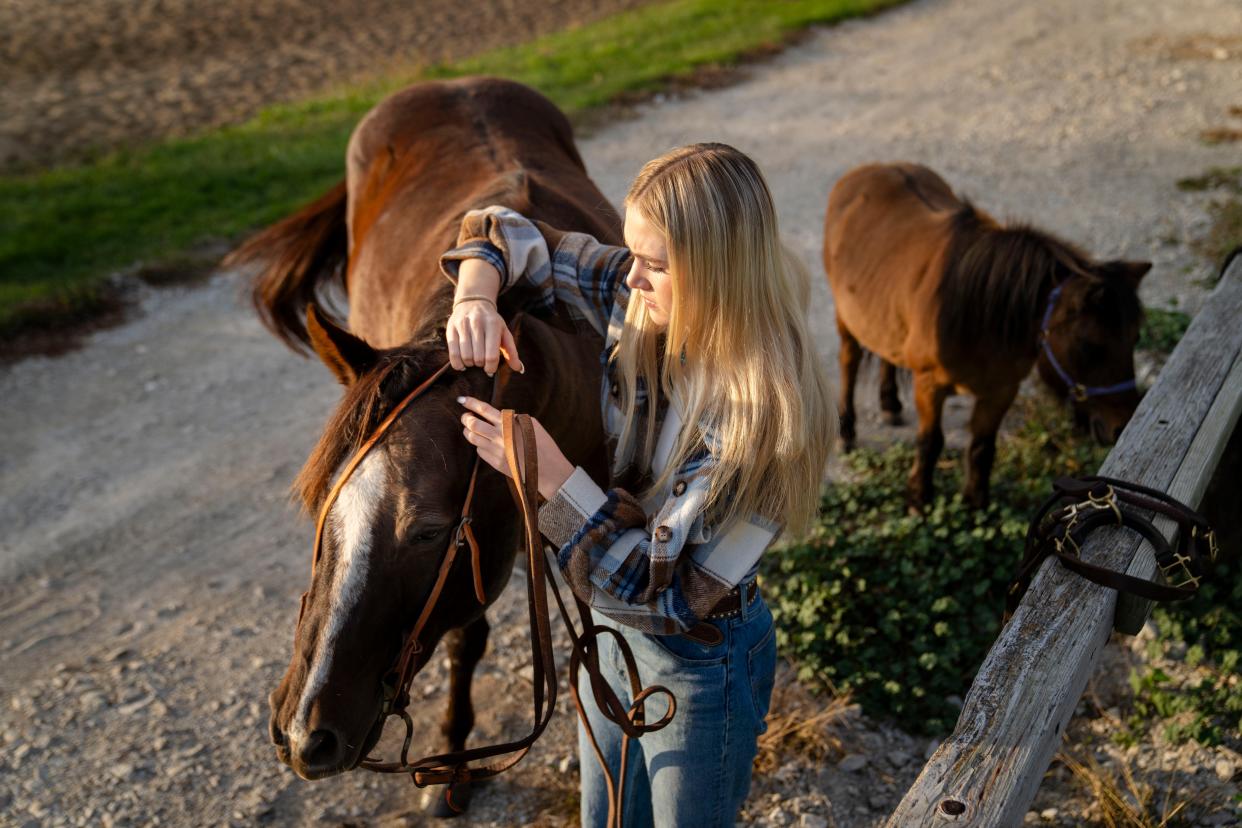
On clear afternoons, Elivia walked the well-worn path to her barns to watch friends work out her horses as she recovered. She was appreciative, of course, but, man, did she leave those practices wanting so badly to be the girl on the horse instead of the one in the stands.
Her pelvis healed in a little over a month, faster than the doctors expected, Dawn says. But they cautioned: Even if your pelvis is at little risk for reinjury, your core muscles have to regain strength. And getting back on a horse now would be pretty agonizing.
A few days after that doctor appointment, Elivia competed in a “halter class” at her local county fair, an event where horses are led, not ridden. And a week or so later, Elivia took Chicken for a couple of laps in the arena.
At 17, Chicken had been semi-retired for years now, but considering they’d basically grown up together, their trust in each other ran deep, Elivia says. If she was going to come back, Chicken would be the one to bring her back.
“She's a babysitter-type horse. She knows her job,” Elivia says. “She doesn't need me to pound on her, so I just lightly ride her.”
Elivia had been eyeing the calendar closely as she recovered. She had only one year of eligibility left in the junior division of the Iowa State Fair’s Cowgirl Queen Contest, a competition she’d been entering for years and her family — including Dawn and even Dawn’s mother — had entered for decades.
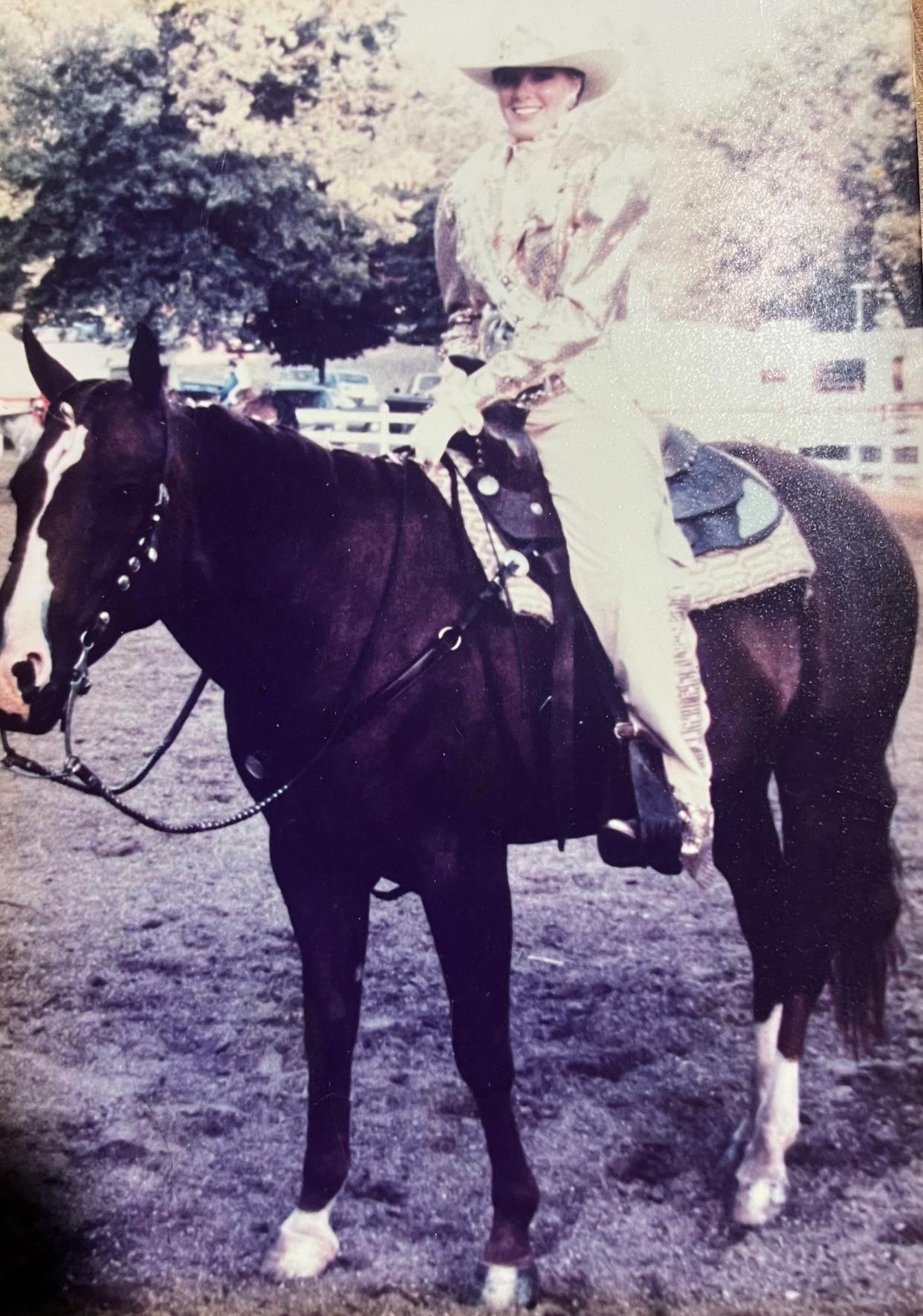
The competition isn’t one college recruiters are following; it’s purely for fun, which Elivia desperately needed. And amid all the pressures of competitions that do affect rankings and standings, this one always reminds Elivia of that girl who loved to ride the pony, her “why.”
And, if she were being honest, it’s a competition she really wanted to win.
If she could ride, she told her mom, why waste the entry fee?
That major comeback: What her spirit needed to return
The horse barn feels more beauty parlor than stable in the hours before the Cowgirl Queen Contest. Glitter and sparkles glint in the normally drab stalls as ring lights add glow for girls to clip in extensions, coiffed in place by “mega hold” hair spray, or pop on big eyelash extensions framing technicolor eyeshadow.
The Papcuns check in early and set about preparing for the show immediately, no need for the chaos of a rushed setup to add to the anxiety of the day.
Elivia and Dawn promised each other that if something — anything — started to feel off to either of them, they’d drop out of the competition. No whining.
“I got a lot of parent judgment. I got a lot of snotty eyes,” Dawn says. “I know it's because they love my kid and thought that I was being careless. But they didn't know me, and they didn't know her, and they didn't know the whole situation.”
Frankly, the stakes felt super low. Elivia hadn’t ridden in competition in almost three months. No one is expecting a great showing from her.
But adaptability has always been Elivia’s strength, says another of her coaches, Janelle Ward Schaefer. She knows how to feel a horse’s mood, understand whether they are on their mark or they are uncomfortable. And Chicken was on her mark that day.
“You can't teach that; it's something that you have to learn and acquire,” Schaefer says. “That knowing the animal well enough that you can read what they're thinking before they're thinking it just comes from experience.”
The Cowgirl Queen Contest sees girls ride to called-out cadences — walk, lope, trot — before answering a question from the judges and finally completing the “queen salute,” where each horse individually gallops around the ring and comes to a sliding stop as the rider holds the reins with just one hand.
The move’s not all too different from the rundown Elivia had been practicing with Wall-E a few months earlier.
A real showstopper. And a test of how well rider and horse have figured out the puzzle of being a team.
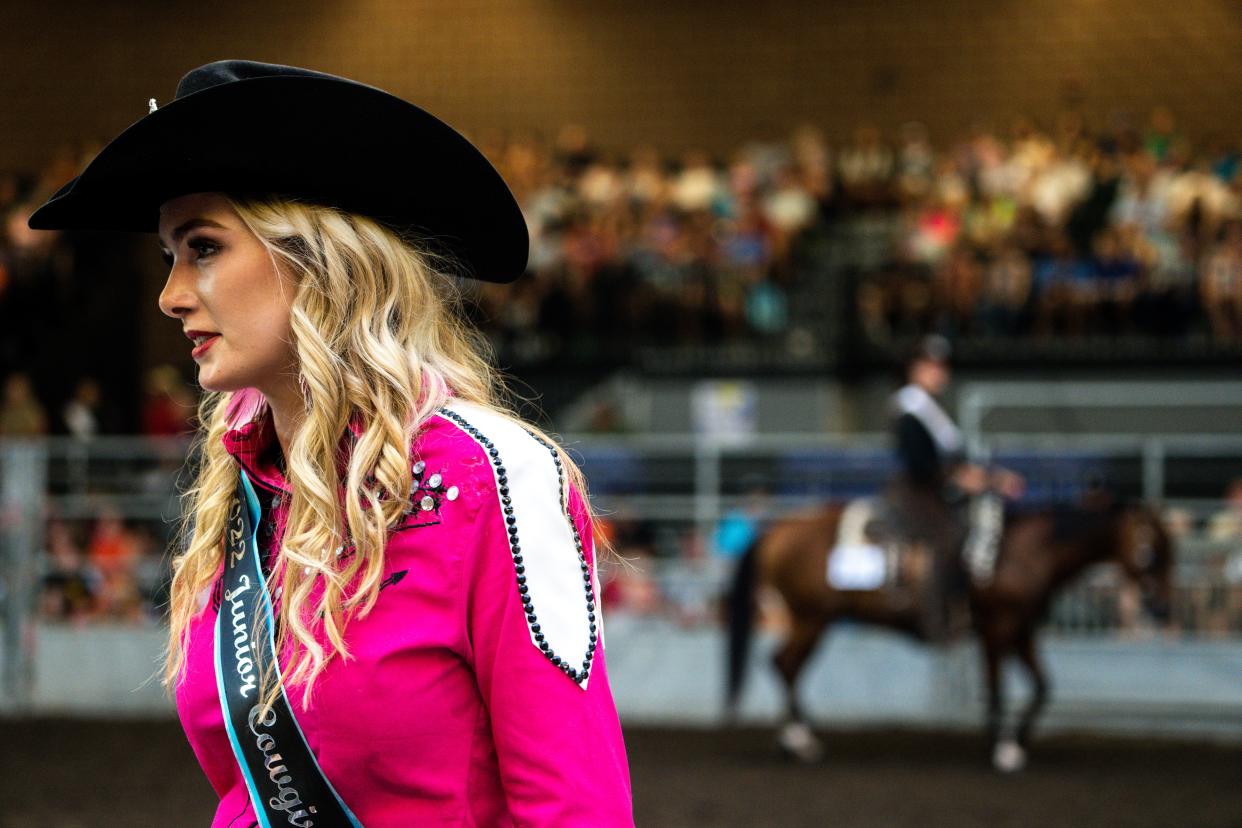
By the time Elivia gets to the salute, she is the clear favorite. The audience claps and stomps as she nails her stop, confidence washing over her, and the roar only grows when the judges confirm: Elivia has won Cowgirl Queen.
For the family, the moment marks a turning point. The fear that had wound its way around Dawn’s heart since she saw her daughter on that arena floor releases; the incredible tension of the question gnawing at her gut — “Will Elivia return?” — eases.
“It was what her spirit needed. It was what we needed.”
Not every competition goes as smoothly as the Cowgirl Queen. In fact, many don't. But Elivia’s determination and unflappability keep her on route for a Division 1 scholarship.
And on the very first day that colleges are allowed to reach out to possible recruits — June 15 before their junior year, which was just a few days over a year since her accident — Elivia’s phone starts ringing. Texas Christian University, Baylor and then Georgia.
In the equestrian world, receiving calls from these schools is like a football player getting looks from Alabama, Michigan and, well, Georgia.
They each want to give her an official visit. And in the fall, she verbally commits to TCU.
Her comeback — the one she hadn’t planned on — feels mostly complete now. Though she’d long ago decided that if she wasn’t able to ride at the most competitive level, she’d find her joy in the little moments, the training, grooming, feeding. Just her and horse.
She sees life like a game of Pick-up Sticks now: The realities fall, askew, sometimes, from where you’d hoped, and yet still you find a way to collect what you need, to fulfill a purpose. What feels like a conclusion, she knows, can actually be a waystation to a new state of mind.
“There's never really an endpoint to certain things. You can always find a way to get back up and just keep going,” she says.
As another summer approaches she’ll do just that, including riding in the Queen Contest’s senior division. And this time she’ll perform the salute on Chicken’s baby, Cash — her recovery and revival marked with an ohh and ahh big finish and a wave of self-assurance.
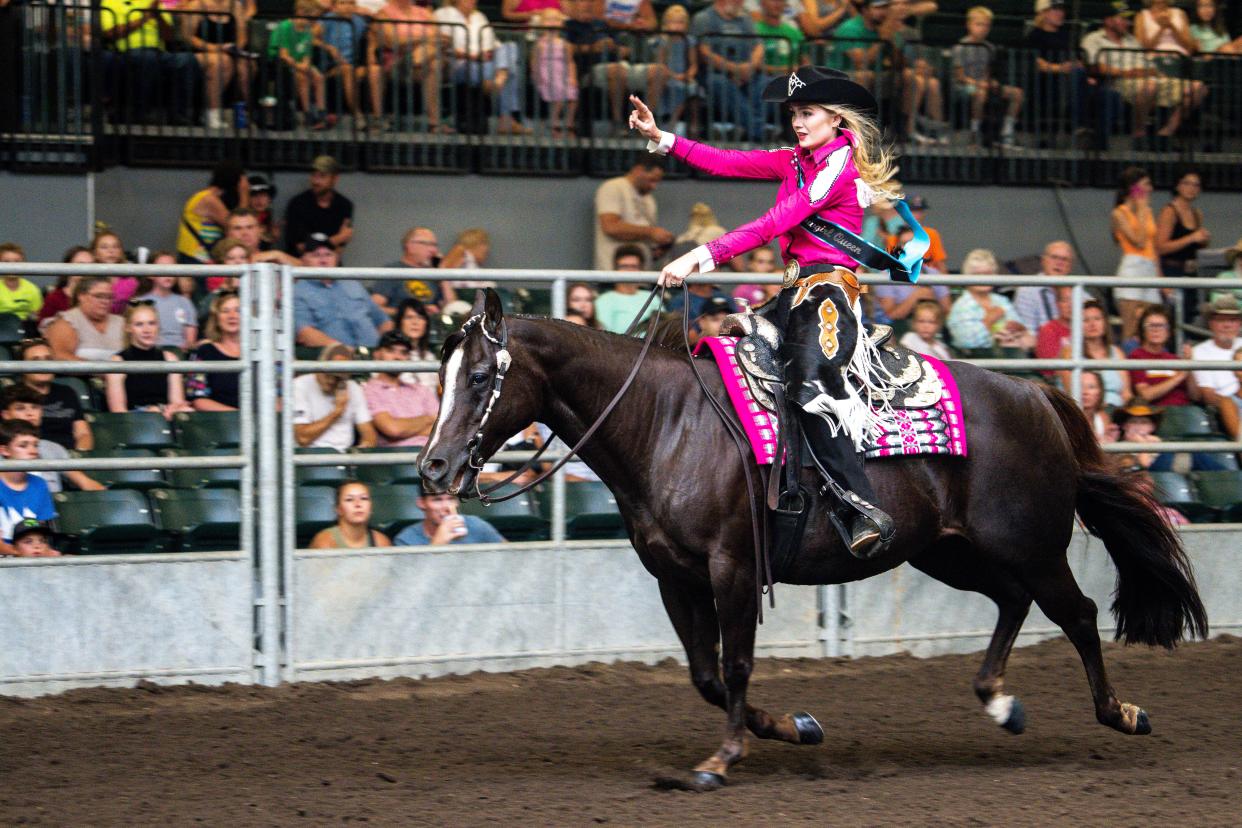
Courtney Crowder, the Register's Iowa Columnist, traverses the state's 99 counties telling Iowans' stories. Reach her at ccrowder@dmreg.com or 515-284-8360.
This article originally appeared on Des Moines Register: Iowa teen overcomes freak horse accident to earn top NCAA scholarship
